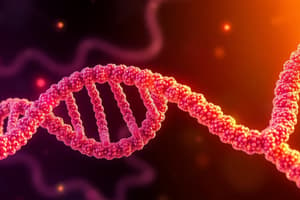Podcast
Questions and Answers
What are the key components required for DNA digestion and plasmid restriction?
What are the key components required for DNA digestion and plasmid restriction?
The key components required for DNA digestion and plasmid restriction are a DNA restriction enzyme, buffer assay, and a substrate such as plasmid DNA.
What is the purpose of creating competent cells in bacterial biology?
What is the purpose of creating competent cells in bacterial biology?
The purpose of creating competent cells in bacterial biology is to make the cells capable of taking up foreign DNA, typically for the purpose of transformation or genetic engineering.
What is the aim of preparing competent cells from E. coli in the laboratory setting?
What is the aim of preparing competent cells from E. coli in the laboratory setting?
The aim of preparing competent cells from E. coli in the laboratory setting is to enable the cells to take up foreign DNA and potentially be transformed for various experimental or practical purposes, such as genetic engineering or the introduction of specific traits.
What is the significance of the temperature 42°C in the process of bacterial cell competence?
What is the significance of the temperature 42°C in the process of bacterial cell competence?
What is the role of calcium in the process of bacterial cell transformation?
What is the role of calcium in the process of bacterial cell transformation?
Flashcards are hidden until you start studying
Study Notes
DNA Digestion and Plasmid Restriction
- DNA digestion and plasmid restriction require three key components: restriction enzymes, which cut DNA at specific recognition sites; methylase, which protects the host DNA from restriction; and ligase, which seals the plasmid DNA into a circular form.
Competent Cells in Bacterial Biology
- Creating competent cells in bacterial biology involves making cells more receptive to taking up external DNA, allowing for genetic manipulation and transformation.
Preparing Competent Cells
- Preparing competent cells from E. coli in the laboratory setting enables researchers to introduce foreign DNA into the bacteria, allowing for the expression of desired traits or genes.
Temperature in Bacterial Cell Competence
- The temperature 42°C is significant in the process of bacterial cell competence because it is the optimal temperature for heat shock, which helps to make cells more competent for DNA uptake.
Calcium in Bacterial Cell Transformation
- Calcium plays a crucial role in the process of bacterial cell transformation by helping to increase cell permeability, allowing DNA to enter the cells more easily.
Studying That Suits You
Use AI to generate personalized quizzes and flashcards to suit your learning preferences.




